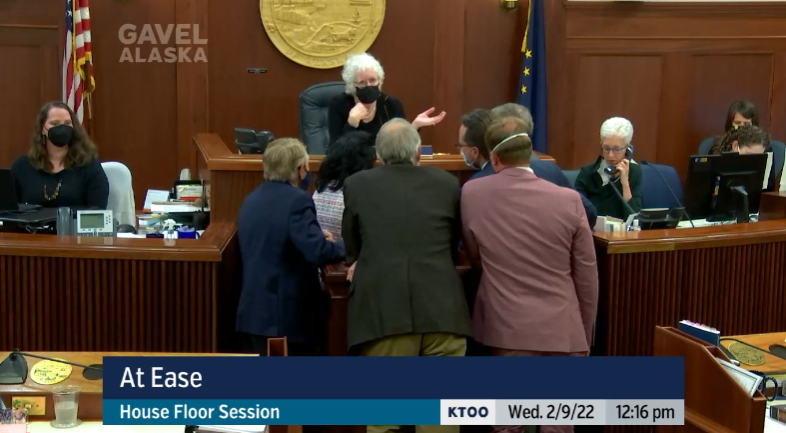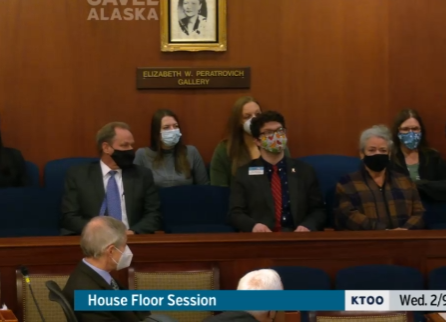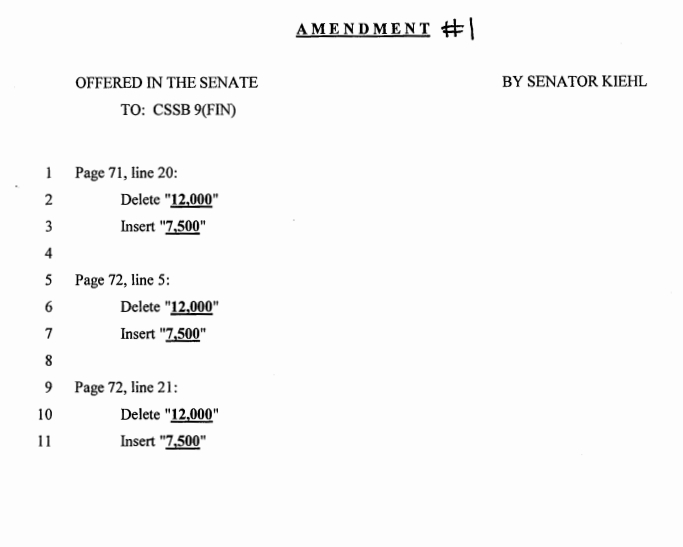
The trial over the Higher Education Investment Fund is underway. The case was brought by several University of Alaska students challenging Gov. Dunleavy's sweep of the fund set up by the #akleg to fund scholarships (and later WWAMI).
The main argument here, as I understand, is the original appropriation setting up the fund is still valid and therefore it's out of reach out of the constitutional budget reserve sweep.
Dunleavy argues it should be funded ad hoc each year, competing with other spending.
Dunleavy argues it should be funded ad hoc each year, competing with other spending.
Former Attorney General Jahna Lindemuth is handling the oral arguments for the plaintiffs. She's outlining the legal argument that the funds have not lapsed.
She says it's the only one consistent with the plain language of the Alaska Constitution and precedent.
She says it's the only one consistent with the plain language of the Alaska Constitution and precedent.
And we get a reference to the Wielechowski PFD case.
Lindemuth says it supports the UA students' position that the fund cannot be moved without legislative action and therefore should not be subject to the sweep.
Lindemuth says it supports the UA students' position that the fund cannot be moved without legislative action and therefore should not be subject to the sweep.
Judge Adolf Zeman asks about the state's position that a Hickel-era case already clarified the sweep.
Lindemuth says that's her closing, but says that Hickel is fundamentally different because it was never about what was sweep-able.
Lindemuth says that's her closing, but says that Hickel is fundamentally different because it was never about what was sweep-able.
Lindemuth notes that the Hickel ruling specifically said any funds that have been "validly appropriated should not be counted as available."
The argument here is the appropriation filling the Higher Education Investment Fund is still valid.
The argument here is the appropriation filling the Higher Education Investment Fund is still valid.
The HEIF is different than the Power Cost Equalization, which was the subject of its own sweep-focused lawsuit last year. Because PCE was specifically created outside of the general fund, it wasn't subject to the sweep.
The HEIF was created as a subfund in the general fund.
The HEIF was created as a subfund in the general fund.
Lindemuth says that it's a still an important difference. Noting that a general fund is typically a pot of money with no specific use.
The scholarship fund does have a purpose. To pay scholarships.
The scholarship fund does have a purpose. To pay scholarships.
Lindemuth is now going after the state's legal position, noting that AG Treg Taylor has already made several key concessions that undermine their position.
"It's like they're following the Hickel recipe for baking a cake while leaving out key ingredients like sugar and butter."
"It's like they're following the Hickel recipe for baking a cake while leaving out key ingredients like sugar and butter."
Then there's some discussion about whether or not rulings apply to issues that were beyond what they were originally about.
Judge Zeman questions whether that's up for him to decide or for the Supreme Court to decide.
Lindemuth says he decides and the Supreme Court reviews.
Judge Zeman questions whether that's up for him to decide or for the Supreme Court to decide.
Lindemuth says he decides and the Supreme Court reviews.
Lindemuth wraps up by asking that the HEIF be restored, arguing that the actions by the governor were driven by his different legislative priorities and was a "money grab" that deprived the Legislature's right to endow the scholarships into perpetuity.
Up now for the state is Margaret Paton Walsh.
She argues that the Hickel decision does, in fact, apply. She also argues that laws that bind the sweep should also bind the legislature.
She argues that the Hickel decision does, in fact, apply. She also argues that laws that bind the sweep should also bind the legislature.
Judge Zeman asks if the distinction here is that the endowment isn't the final step for the funding. It goes there and then the Legislature has to take action "in order to funnel it to hard dollars."
Paton Walsh says, yep. That's the thinking.
Paton Walsh says, yep. That's the thinking.
Then some talk about other funds that are designated for specific purpose.
Judge Zeman asks what would happen if the Leg. earmarks the fund, would it be subject to the sweep? Paton Walsh says no, it would not be sweep-able. Notes also donations can't be swept.
Judge Zeman asks what would happen if the Leg. earmarks the fund, would it be subject to the sweep? Paton Walsh says no, it would not be sweep-able. Notes also donations can't be swept.
Paton Walsh says that because the Legislature pulled money out of the HEIF for WWAMI essentially undermines the Legislature's argument that it's a restricted fund. She says they can do whatever they want with it so therefore it should be swept.
Paton Walsh also notes that the fact the sweep exists doesn't make endowment funds pointless. They're only pointless when the constitution requires a sweep like when the CBR has a huge IOU (like it currently does and will for pretty much forever)
Paton Walsh says the CBR sweep should be firm. That the Alaska Constitution has prioritized refilling the constitutional budget reserve (also, meanwhile, Dunleavy's budget isn't proposing much savings)
There's a question about how the HEIF is different than a multi-year capital appropriation. Paton Walsh says it's because capital appropriations are a spending appropriation. She says that's different than the HEIF, which is parking money.
Judge Zeman asks how a bridge funding is "different than a four-year education? Or medical education?"
Paton Walsh says it's because the scholarships require a two-step appropriation from the fund to the scholarships.
Paton Walsh says it's because the scholarships require a two-step appropriation from the fund to the scholarships.
Paton Walsh says the idea behind the HEIF was "Some sort of stability for the course of their education" but it has limits.
"It's not actually a promise. It's not a contract."
"It's not actually a promise. It's not a contract."
Paton Walsh says higher education is "not at all" like construction spending.
"The program is all discretionary. It's all just words. The Legislature can honor it or not honor if it wants. It's not like signing a contract with a contractor."
"The program is all discretionary. It's all just words. The Legislature can honor it or not honor if it wants. It's not like signing a contract with a contractor."
Paton Walsh says the ONLY protections against the sweep are for programs that don't require additional action by the Legislature to enact.
She says they don't apply here because the HEIF requires an additional appropriation.
She says they don't apply here because the HEIF requires an additional appropriation.
Lindemuth is back up for the plaintiffs.
She's talking about some of the technical differences between what the state claims and what the plaintiffs see as the proper interpretation of the sweep.
She's talking about some of the technical differences between what the state claims and what the plaintiffs see as the proper interpretation of the sweep.
Lindemuth says the state's wrong in its partial application of the Hickel process. She says it's wrong that they get to ignore whatever doesn't work for them.
"She wants to leave out the butter and sugar and call it a cake when she's ignoring part of the Hickel process."
"She wants to leave out the butter and sugar and call it a cake when she's ignoring part of the Hickel process."
Lindemuth also notes that all money is always available for appropriation whenever they want. They can always reconsider past appropriations. You can't bind future legislatures.
This is a point that is critical to most of the talk around budgeting.
This is a point that is critical to most of the talk around budgeting.
Lindemuth notes that the state's arguments that capital project spending is sacrosanct doesn't even apply. She notes that the Legislature can also change its mind.
She says there's no difference between spending appropriations and investment appropriations.
She says there's no difference between spending appropriations and investment appropriations.
Lindemuth says the Legislature's investment in scholarships "is a terminal appropriation and it's the same as building a building."
"It's not simply cash in the bank as the executive branch would like you to believe."
"It's not simply cash in the bank as the executive branch would like you to believe."
Judge Zeman says he'll have a decision out by or before Feb. 22.
That's it for the arguments today.
That's it for the arguments today.
• • •
Missing some Tweet in this thread? You can try to
force a refresh













